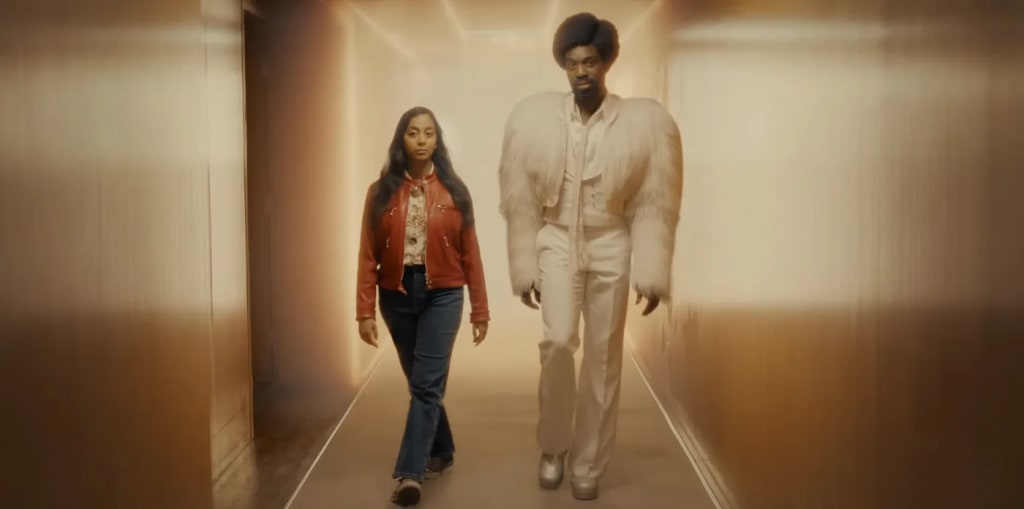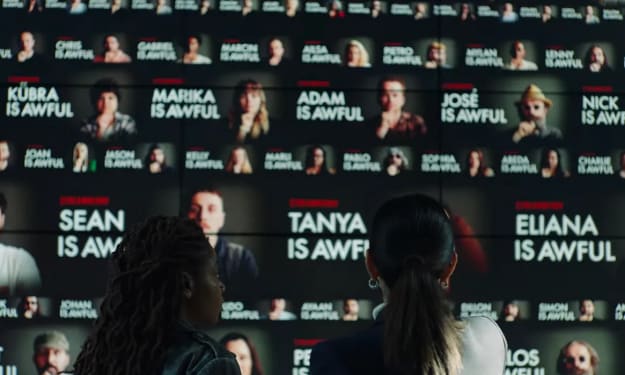Why Can’t “Black Mirror” Kill Fascists?
Nuclear armageddon comes so close to perfection

The Black Mirror episode Demon 79 is a fun romp set in 1979 England. Protagonist Nida is a Brown woman that works at a department store. The episode is set against a rise in white supremacist fascism, particularly the xenophobic National Front or NF. She stumbles across a demonic rune that forces her to sacrifice three bodies or risk causing nuclear armageddon, leading her to take revenge against some of the more awful figures in her life.
There is a lot to like about this episode. The central relationship between Nida and her demon companion Gaap is delightful. The premise is also something that I love: I can never get enough stories about protagonists killing fascists (a huge reason why I simply loved the show Santa Clarita Diet).
This episode had everything I needed to be one of my favorite ones of the year, and then the ending happened, and it stepped back from its premise in one of the most frustrating ways.
So close, yet so far
For most of the episode, the show had set up some excellent commentary on the nature of politics and fascism. The racism that Nida endures is often more subtle than being directly attacked. A scene near the beginning has her going to the fish and chips place around the corner from her home. There is a sense of tension in the air as she glances at the sight of a skinhead and nervously tries to open her door. The following day she awakes to find the symbol “NF” on her front gate.
This hatred is a constant element in her life and one that she often does not feel empowered to fight against. Nida has intrusive thoughts where she violently punishes the racist men and women who harass her daily, and the arrival of Gaap and the three sacrifices conceit allows her to fight against a system that she would be normally punished for resisting.
The racism of 1979 Britain is a persistent and often banal force. Perhaps one of the best monologues on this issue comes from Conservative party member Michael Smart, who is running a “tough on crime,” “save our neighborhood” campaign — in essence, one filled with xenophobic dog whistles. He is interacting with one of Nida’s coworkers, Vicky, a pretty open NF supporter. He tells her that she should vote for him instead of the NF because he’s just as racist, but unlike the NF, will actually win, saying:
“[NF] is too overt. People feel it’s, um, bad manners. You know why I don’t print stop immigration in gigantic letters on my campaign literature?…Because…You know what I stand for.”
That’s a refreshing monologue in an industry that often tries to depict racism as an overt series of actions rather than a system of harm. Nida’s journey to murderous corruption is fun to watch because it’s centered in response to such a system. She kills a pedophile, a repulsive man that murdered his wife, that man’s roommate, and as her last victim, Nida sets her sights on Conservative nominee Michael Smart. She has been told via demonic premonition that Smart will grow to immense power and eventually succeed in building a surveillance-based ethnostate in Britain. So it seems only natural that this figure even hell has described favorably should be last on the chopping block in Nida’s race to stop the apocalypse.
We are being set up for this big catharsis, where Nida chases down Michael Smart in her car, dressed up to the nines in a fabulous red jacket, and moves to bludgeon him to death with a hammer, but then a f@cking cop arrives and stops her from killing him. Nida (and Gaap) fail their assignment, and the apocalypse begins — though Nida thankfully gets to spend eternity with her demonic companion in some empty cosmic void (yay?).
The failure to stop the apocalypse is not the issue here. Not every story needs to end in a peaceful resolution, especially Black Mirror, which is notorious for its grim conclusions. The strangeness and frustration come in the framing of that last scene, where Nida is held to this moral standard by a f@cking police officer, who convinces her not to kill a man we know would cleanse Britain of millions if he had the opportunity. And she does this for what, kindness?
For me, there is a racial and gendered element that comes with how the scene unfolds. We end with a police officer literally policing the rage of a brown woman who is trying to stop the emergence of both the apocalypse and an ethnostate. It feels paternalistic, and if there had been a white man or even a white woman in the same position, I am not sure the narrative would have let Smart off so easily.
In fact, given that this season started with a white woman smashing a simulated universe and killing billions of digital life in the process (see Joan Is Awful), I can safely say it wouldn’t. I mentioned briefly the Santa Clarita Diet (another Netflix show), but just to reiterate, there is an entire scene in that show where the protagonist kills neo-nazis for food, and we are meant to find it funny. We could also look at the dozens upon dozens of films where men mow nazis down without the viewer batting an eye.
It seemed strange to deny the audience this catharsis and ultimately somewhat cowardly, given how strong they came out against white supremacy in the first half of the episode.
A fiery conclusion
With this narrative, I see a deep squeamishness with the reality that sometimes hateful people must be dealt with by using violence. The story is perfectly fine with pedophiles and murderers getting the axe (or, in this case, hammer), but somehow draws the line at British Hitler. It feels absurd.
The most disappointing fact is that this episode was quite strong, and if it had only made this single adjustment, I would have written an entirely different review. Again, the ending could have still finished sadly with the apocalypse, but at least give us the catharsis, or if you refuse to do that, deny it to us some other way that ties into the themes of the narrative, such as the police officer being an NF supporter who ultimately defends Smart from harm.
Instead, we are left with frustrating paternalism just as dangerous as any apocalypse.
About the Creator
Alex Mell-Taylor
I write long-form pieces on timely themes inside entertainment, pop culture, video games, gender, sexuality, race and politics. My writing currently reaches a growing audience of over 10,000 people every month across various publications.






Comments
There are no comments for this story
Be the first to respond and start the conversation.